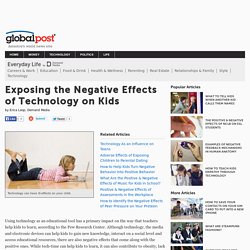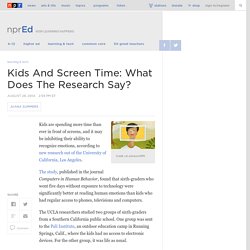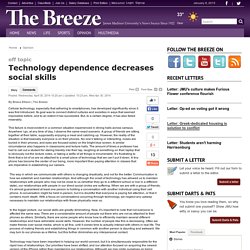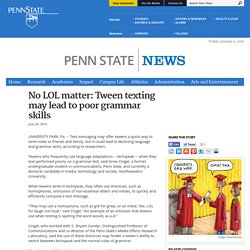

Exposing the Negative Effects of Technology on Kids. Using technology as an educational tool has a primary impact on the way that teachers help kids to learn, according to the Pew Research Center.

Although technology, the media and electronic devices can help kids to gain new knowledge, interact on a social level and access educational resources, there are also negative effects that come along with the positive ones. While tech-time can help kids to learn, it can also contribute to obesity, lack of physical fitness, inaccurate or warped thinking and other negative consequences. Obesity and Physical Fitness The American Academy of Child and Adolescent Psychiatry notes that obesity -- or having a body weight that is at least 10 percent more than the recommended number of pounds for the child's age and height -- has multiple causes, one of which is a lack of exercise. Knowledge and Learning Along with advances in technology comes an ever-growing ability for kids to get in touch with information and educational resources.
Social Media. Kids And Screen Time: What Does The Research Say? : NPR Ed. Kids are spending more time than ever in front of screens, and it may be inhibiting their ability to recognize emotions, according to new research out of the University of California, Los Angeles.

The study, published in the journal Computers in Human Behavior, found that sixth-graders who went five days without exposure to technology were significantly better at reading human emotions than kids who had regular access to phones, televisions and computers. The UCLA researchers studied two groups of sixth-graders from a Southern California public school. One group was sent to the Pali Institute, an outdoor education camp in Running Springs, Calif., where the kids had no access to electronic devices. For the other group, it was life as usual. At the beginning and end of the five-day study period, both groups of kids were shown images of nearly 50 faces and asked to identify the feelings being modeled.
A Wake-Up Call For Educators There's a big takeaway for schools, Greenfield says. Here's What A Constantly Plugged-In Life Is Doing To Kids' Bodies. Infographic by Alissa Scheller for The Huffington Post.

If it seems like your kids are constantly plugged in, tapping away on their iPhones, obsessively gaming and SnapChatting way more than they're actually ... chat-chatting -- well, that's because they are. It's estimated that children ages 8 to 18 spend an average of seven hours a day behind screens; teens send an average of 3,417 text messages each month; and 97 percent of adolescents have at least one electronic device in their bedrooms. What's just as scary as how much time kids spend on screens is the effect it can have on their health. Their backs and wrists are sore, their sleep is disrupted and their attention spans are diminished. While it would be impossible to rid your kids' lives of technology completely -- and you wouldn't want to, because of its many joys and benefits -- parents can take a few measures to help prevent its negative mental and physical side effects.
What To Do: Dr. They're Less Active Their Sleep Is Disrupted. When Children Text All Day, What Happens To Their Social Skills? Parents have a long list of concerns about children using technology: Will they be hurt by cyber bullying?

Or meet with online predators? Will their homework suffer because they're texting 100 times a day? Are they sexting? But what about a more basic question like, Will they be able to hold their own in conversation? Actual conversation is becoming a thing of the past, warn some who study child development, and that's not good for our kids' future. It's true many of us don't exercise our face-to-face socialization muscles as frequently as we did before the age of smartphones. Technology dependence decreases social skills - The Breeze: Opinion. Cellular technology, especially that adhering to smartphones, has developed significantly since it was first introduced.

Its goal was to connect distinct cultures and societies in ways that seemed impossible before, and to an extent it has succeeded. But, to a certain degree, it has also failed miserably. This failure is most evident in a common situation experienced in dining halls across campus. Anywhere I go, at any time of day, I observe the same exact scenario. A group of friends are sitting together at their table, supposedly enjoying a meal and catching up. The way in which we communicate with others is changing drastically, and not for the better. In the bigger picture, our social skills are greatly diminishing.
Technology may have been important in helping our world connect, but it is simultaneously responsible for the rapid loss of relationships. Briana Ellison is a freshman media arts and design major. No LOL matter: Tween texting may lead to poor grammar skills. UNIVERSITY PARK, Pa. -- Text messaging may offer tweens a quick way to send notes to friends and family, but it could lead to declining language and grammar skills, according to researchers.

Tweens who frequently use language adaptations -- techspeak -- when they text performed poorly on a grammar test, said Drew Cingel, a former undergraduate student in communications, Penn State, and currently a doctoral candidate in media, technology and society, Northwestern University. When tweens write in techspeak, they often use shortcuts, such as homophones, omissions of non-essential letters and initials, to quickly and efficiently compose a text message. "They may use a homophone, such as gr8 for great, or an initial, like, LOL for laugh out loud," said Cingel. "An example of an omission that tweens use when texting is spelling the word would, w-u-d. " Cingel, who worked with S. Cingel gave middle school students in a central Pennsylvania school district a grammar assessment test.